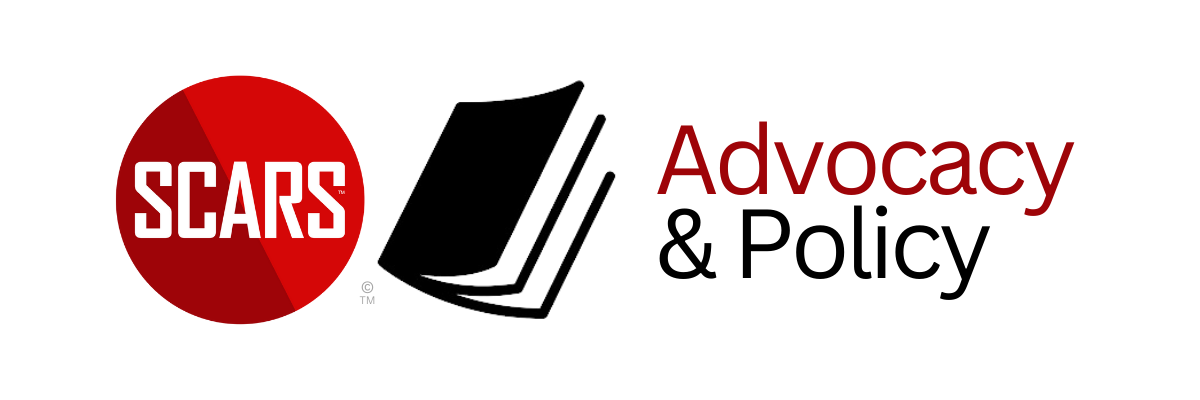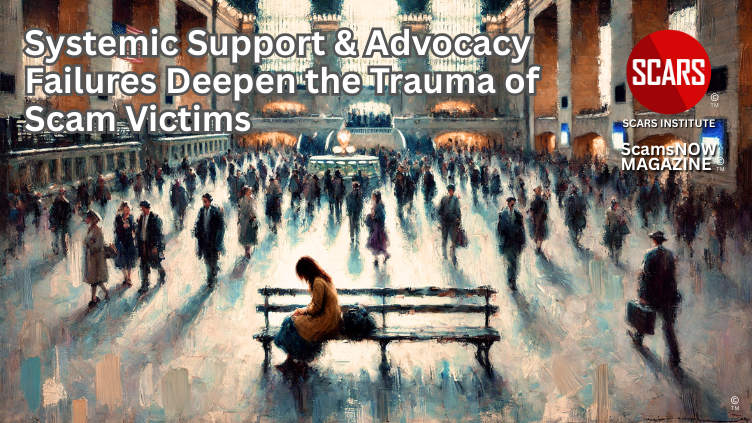Systemic Support & Advocacy Failures Deepen the Trauma of Scam Victims
The Aftermath of Deception for Scam Victims Worldwide
Primary Category: Scam Victim Advocacy
Intended Audience: General Public
Author:
• SCARS Editorial Team – Society of Citizens Against Relationship Scams Inc.
About This Article
Scam victims around the world are not only devastated by the initial betrayal of fraud but are often retraumatized by the very systems meant to help them. In many cases, the emotional pain and shame of the experience are made worse by public judgment, inaccessible victim services, and a lack of coordinated legal or emotional support. While scammers exploit trust with devastating effect, it is the systemic failures—from underfunded victim assistance programs to indifferent societal attitudes—that deepen the wound and delay healing. Victims suffer in silence, shamed by stigma and abandoned by institutions unprepared for the scale of modern fraud.
For many, recovery is possible only when they find trauma-informed support—often through nonprofit organizations like the SCARS Institute, which stand in the gap where governments and traditional services fall short. But even these programs are under threat globally as funding diminishes while demand surges. To prevent further victimization and support meaningful recovery, governments, communities, and families must recognize that scam trauma is real, and that victims need long-term, professional care—not blame, silence, or empty apologies. Without that, the damage done by scammers continues long after the money is gone.

The Aftermath of Deception: How Systemic Support & Advocacy Failures Deepen the Trauma of Scam Victims Worldwide
In the wake of a scam, victims often find themselves grappling not only with the financial devastation but also with a profound emotional toll that can leave them isolated, ashamed, and on the brink of despair.
While the initial betrayal by a scammer is a deeply personal violation, it is often the systemic failures—lack of adequate support and advocacy, funding cuts to victim services (SCARS Institute is immune from this,) and societal stigma—that push survivors to their darkest moments.
Across the globe, scam victims are facing a crisis as vital support services struggle under the weight of reduced funding, increased demand, and bureaucratic indifference, leaving many without the lifeline they desperately need to rebuild their lives. This is especially true in the United Kingdom.
The Hidden Trauma of Scam Victims
Scams, whether they involve romance fraud, investment schemes, financial fraud, or identity theft, exploit trust in the most insidious ways. According to the 2024 Global State of Scams Report by the Global Anti-Scam Alliance and Feedzai, scammers siphoned over $1.03 trillion globally in a single year (SCARS Institute believes this to be double that amount), affecting countless individuals across all demographics. This does not even consider the staggering Federal Government fraud that has been uncovered this year.
Beyond the staggering financial losses—averaging $13,520 per victim in the U.S. alone—the emotional impact is often far more debilitating. Victims report severe anxiety, depression, and even post-traumatic stress disorder (PTSD), with a 2015 FINRA survey noting that two-thirds of scam victims experience significant emotional consequences, including trauma, sleep disorders, and suicidal thoughts.
Take, for example, the experience of a victim, Sarah (name changed), a 62-year-old retiree who lost her life savings to a romance scam. After months of online correspondence with someone she believed to be a genuine partner, Sarah sent over $80,000 to help with a fabricated medical emergency. When the truth unraveled, she was left not only financially destitute but also emotionally shattered, grieving the loss of a relationship she thought was real. “I felt like I’d lost a part of myself,” she said. “The shame was unbearable—I couldn’t even tell my family. I kept thinking, how could I have been so foolish?”
Sarah’s story is not unique. The emotional fallout from scams often mirrors the grieving process, compounded with betrayal trauma, with victims cycling through denial, anger, and self-blame. Scam victims who developed a relationship with the criminals, in particular, face a double blow: the financial loss coupled with the heartbreak of a fabricated relationship. As Christine Kieffer from the FINRA Investor Education Foundation notes, the trauma is compounded by “negative thoughts about themselves,” with victims questioning their intelligence and decision-making abilities. This self-blame can be paralyzing, preventing many from seeking help or reporting the crime due to fear of judgment.
The Role of Support Services: A Lifeline Under Threat
For many scam victims, support services provide a critical lifeline, offering emotional counseling, practical advice, and a safe space to process their experiences. Organizations like the SCARS Institute have developed the world’s leading programs for scam victims. These services are free and confidential, providing a judgment-free environment where survivors can share their stories and realize they are not alone.
Consider the case of Robert, a 50-year-old small business owner who fell victim to a business email compromise (BEC) scam, losing $150,000. After the scam, Michael struggled with intrusive thoughts and a plummeting sense of self-worth, exacerbated by the scammer’s mocking messages before he cut contact. Joining a virtual support group through a program with SCARS, Robert found solace in connecting with others who understood his pain. “Hearing others say, ‘It’s not your fault,’ helped me start to forgive myself,” he might reflect. “It was the first time I felt safe enough to talk about what happened.”
However, these vital services are with many support providers and advocates are increasingly at risk due to funding cuts and rising operational costs, but note that SCARS Institute does not depend on government funding. Globally, victim support organizations are facing a perfect storm of challenges. In many regions, government funding for victim services has been slashed, while operational costs—such as staff salaries and program expenses—have risen due to economic pressures like inflation and tax hikes. For instance, a hypothetical 4% reduction in funding for victim support services in a country like Canada could translate to a $2 million deficit for a major charity, potentially leading to the loss of dozens of counselors or the closure of entire programs. This mirrors real-world trends, where charities report deficits that force them to scale back services at a time when demand is soaring.
The impact of these cuts is and will be even more devastating. In 2023 alone, people over 60 lost $3.4 billion to financial scams worldwide (as reported), with the elderly being particularly vulnerable to tech support, grandparent, and government impersonation scams. Yet, as the need for support grows, the resources to provide it are shrinking. Victims who once relied on these services to navigate the legal and emotional fallout of fraud are now left to fend for themselves, often at the most vulnerable point in their recovery.
Systemic Failures: The Real Culprit Behind Victims’ Despair
While the scammer’s deception initiates the trauma, it is often the systemic response—or lack thereof—that drives victims to their lowest points. The justice system, already strained by backlogs and underfunding, frequently fails to deliver accountability for scam victims. According to the 2024 Global State of Scams Report, only 4% of scam victims worldwide recover their losses (SCARS Institute believes that it is much lower since so few victims report these crimes), with even the highest recovery rates in the U.S. and U.K. remaining dismally low. This lack of financial recourse leaves victims like Sarah and Robert not only broke but also without closure, forced to grapple with the daily reminder of their loss as they adjust to a new, often impoverished reality.
Moreover, societal attitudes toward scam victims often worsened their suffering. Unlike victims of violent crimes, who may receive more immediate empathy, scam victims are frequently met with blame and skepticism. “People think you must be gullible or desperate to fall for a scam,” Sarah laments. This victim-blaming culture, as highlighted by the FINRA Foundation, shifts focus away from the perpetrators and discourages victims from seeking help. The shame and isolation that result can be as damaging as the financial loss itself, with some victims, like those surveyed by the Identity Theft Resource Center, reporting suicidal thoughts at a rate of 12%—a figure that, while down from previous years, remains alarmingly high. The SCARS Institute believes that as many as 50 scam victims take their lives each day.
The legal system’s inefficiency compounds the problem. Reporting a scam often leads to a dead end, with law enforcement agencies overwhelmed and under-resourced to tackle the global nature of cybercrime. Scammers frequently operate across borders, transferring stolen funds offshore within hours, making recovery nearly impossible. In Australia, for example, the National Anti-Scam Centre advises victims not to engage with services promising to recover funds for an upfront fee, as these are often secondary scams targeting the already vulnerable. Yet, without viable alternatives, victims are left feeling abandoned by the very systems meant to protect them.
The Human Cost: Stories of Struggle and Resilience
The human cost of these systemic failures is profound. Imagine Elina, a 70-year-old widow who lost $200,000 to an investment scam promising high returns. After the scam, Elina turned to a victim support service for help, where a support volunteer assisted her in reporting the fraud to her bank and provided emotional support to cope with her grief. “She was like a friend I could trust,” Elina said of her caseworker. “She helped me feel human again when I felt like nothing.” But with funding cuts looming, the program Elina relied on faces closure, leaving future victims without the same support. “I worry for others who won’t have someone to turn to,” she added. “The loneliness after a scam is crushing—without help, I don’t know how they’ll survive.”
Similarly, consider Carlos, a 42-year-old father who lost $50,000 to a fake tech support scam. Already struggling to support his family, Carlos found himself spiraling into depression, unable to confide in his loved ones due to shame. A Survivor’s School scam victim course and peer support group, provided by the nonprofit SCARS Institute, gave him the ability to really understand the crime and his response to it, and a space to share his story and rebuild his confidence. “They understood the fear and the guilt in a way no one else could,” Carlos reflected. But with many nonprofits facing financial strain, such programs are at risk, threatening to leave victims like Carlos isolated and without resources.
A Call for Change: Prioritizing Victims in a Digital Age
The plight of scam victims underscores a broader societal failure to adapt to the realities of the digital age. As scams become more sophisticated—fueled by technologies like generative AI, which can create realistic deepfakes and voice recordings—the need for robust victim support has never been greater. Yet, governments and institutions are generally moving in the opposite direction, cutting funding at a time when investment in these services is critical.
To address this crisis, a multi-faceted approach is needed. First, governments must prioritize funding for victim support services, ensuring that organizations can meet the growing demand without compromising quality. This includes covering rising operational costs and expanding programs to reach underserved populations, such as the elderly and non-English speakers. SCARS Institute also offers Spanish language support services, and has partners in dozens of countries around the world.
Second, law enforcement agencies need better training and resources to tackle cybercrime, including international cooperation to trace and recover stolen funds. Initiatives like the Global Anti-Scam Alliance’s call for shared data across industries could enhance prevention and detection efforts, but they must be paired with support for victims after the fact.
However, nonprofits must make sure that they are using their money wisely, too. Many such nonprofits expend over 70% of their revenue on management. The SCARS Institute stands alone with 100% of it funding going to victim services, and its management are all volunteers.
Finally, societal attitudes toward scam victims must shift. Public awareness campaigns and training courses for families and friends (such as the SCARS Institute’s Scam Survivor’s School – free for victims and their families) can help dismantle the stigma, emphasizing that anyone can fall victim to a scam, regardless of age or intelligence. Encouraging victims to report crimes without fear of judgment—perhaps through anonymous reporting systems—could also increase recovery rates and deter scammers. As Eva Velasquez from the Identity Theft Resource Center notes, “A lot of times, a person isn’t only grieving the loss of their money… but grieving the loss of a relationship they thought was real.” Recognizing this dual loss can foster greater empathy and support.
Conclusion: A Path Forward for Scam Victims
Scam victims deserve better than to be abandoned by the systems meant to protect them. While the initial betrayal by a scammer is a profound wound, it is the lack of support, the stigma, and the systemic failures that often drive victims to their darkest places. By investing in support services, improving legal recourse, and changing societal narratives, we can ensure that survivors like Sarah, Robert, Elina, and Carlos are not left to navigate their trauma alone.
In an era where scams are a trillion-dollar global industry, the true measure of our humanity lies in how we support those who have been deceived—not in how we judge them.
To sign up for a free professionally managed trauma-informed Scam Victims Support & Recovery Program, visit support.AgainstScams.org
For new victims who need to learn how to get help and what to do, visit www.ScamVictimsSupport.org
To enroll in the SCARS Institute’s free Scam Survivor’s School, visit www.SCARSeducation.org
-/ 30 /-
What do you think about this?
Please share your thoughts in a comment below!
Statement About Victim Blaming
SCARS Institute articles examine different aspects of the scam victim experience, as well as those who may have been secondary victims. This work focuses on understanding victimization through the science of victimology, including common psychological and behavioral responses. The purpose is to help victims and survivors understand why these crimes occurred, reduce shame and self-blame, strengthen recovery programs and victim opportunities, and lower the risk of future victimization.
At times, these discussions may sound uncomfortable, overwhelming, or may be mistaken for blame. They are not. Scam victims are never blamed. Our goal is to explain the mechanisms of deception and the human responses that scammers exploit, and the processes that occur after the scam ends, so victims can better understand what happened to them and why it felt convincing at the time, and what the path looks like going forward.
Articles that address the psychology, neurology, physiology, and other characteristics of scams and the victim experience recognize that all people share cognitive and emotional traits that can be manipulated under the right conditions. These characteristics are not flaws. They are normal human functions that criminals deliberately exploit. Victims typically have little awareness of these mechanisms while a scam is unfolding and a very limited ability to control them. Awareness often comes only after the harm has occurred.
By explaining these processes, these articles help victims make sense of their experiences, understand common post-scam reactions, and identify ways to protect themselves moving forward. This knowledge supports recovery by replacing confusion and self-blame with clarity, context, and self-compassion.
Additional educational material on these topics is available at ScamPsychology.org – ScamsNOW.com and other SCARS Institute websites.
-/ 30 /-
What do you think about this?
Please share your thoughts in a comment below!
2 Comments
Leave A Comment
Important Information for New Scam Victims
- Please visit www.ScamVictimsSupport.org – a SCARS Website for New Scam Victims & Sextortion Victims.
- SCARS Institute now offers its free, safe, and private Scam Survivor’s Support Community at www.SCARScommunity.org – this is not on a social media platform, it is our own safe & secure platform created by the SCARS Institute especially for scam victims & survivors.
- SCARS Institute now offers a free recovery learning program at www.SCARSeducation.org.
- Please visit www.ScamPsychology.org – to more fully understand the psychological concepts involved in scams and scam victim recovery.
If you are looking for local trauma counselors, please visit counseling.AgainstScams.org
If you need to speak with someone now, you can dial 988 or find phone numbers for crisis hotlines all around the world here: www.opencounseling.com/suicide-hotlines
Statement About Victim Blaming
Some of our articles discuss various aspects of victims. This is both about better understanding victims (the science of victimology) and their behaviors and psychology. This helps us to educate victims/survivors about why these crimes happened and not to blame themselves, better develop recovery programs, and help victims avoid scams in the future. At times, this may sound like blaming the victim, but it does not blame scam victims; we are simply explaining the hows and whys of the experience victims have.
These articles, about the Psychology of Scams or Victim Psychology – meaning that all humans have psychological or cognitive characteristics in common that can either be exploited or work against us – help us all to understand the unique challenges victims face before, during, and after scams, fraud, or cybercrimes. These sometimes talk about some of the vulnerabilities the scammers exploit. Victims rarely have control of them or are even aware of them, until something like a scam happens, and then they can learn how their mind works and how to overcome these mechanisms.
Articles like these help victims and others understand these processes and how to help prevent them from being exploited again or to help them recover more easily by understanding their post-scam behaviors. Learn more about the Psychology of Scams at www.ScamPsychology.org
SCARS INSTITUTE RESOURCES:
If You Have Been Victimized By A Scam Or Cybercrime
♦ If you are a victim of scams, go to www.ScamVictimsSupport.org for real knowledge and help
♦ SCARS Institute now offers its free, safe, and private Scam Survivor’s Support Community at www.SCARScommunity.org/register – this is not on a social media platform, it is our own safe & secure platform created by the SCARS Institute especially for scam victims & survivors.
♦ Enroll in SCARS Scam Survivor’s School now at www.SCARSeducation.org
♦ To report criminals, visit https://reporting.AgainstScams.org – we will NEVER give your data to money recovery companies like some do!
♦ Follow us and find our podcasts, webinars, and helpful videos on YouTube: https://www.youtube.com/@RomancescamsNowcom
♦ Learn about the Psychology of Scams at www.ScamPsychology.org
♦ Dig deeper into the reality of scams, fraud, and cybercrime at www.ScamsNOW.com and www.RomanceScamsNOW.com
♦ Scam Survivor’s Stories: www.ScamSurvivorStories.org
♦ For Scam Victim Advocates visit www.ScamVictimsAdvocates.org
♦ See more scammer photos on www.ScammerPhotos.com
You can also find the SCARS Institute’s knowledge and information on Facebook, Instagram, X, LinkedIn, and TruthSocial
Psychology Disclaimer:
All articles about psychology and the human brain on this website are for information & education only
The information provided in this and other SCARS articles are intended for educational and self-help purposes only and should not be construed as a substitute for professional therapy or counseling.
Note about Mindfulness: Mindfulness practices have the potential to create psychological distress for some individuals. Please consult a mental health professional or experienced meditation instructor for guidance should you encounter difficulties.
While any self-help techniques outlined herein may be beneficial for scam victims seeking to recover from their experience and move towards recovery, it is important to consult with a qualified mental health professional before initiating any course of action. Each individual’s experience and needs are unique, and what works for one person may not be suitable for another.
Additionally, any approach may not be appropriate for individuals with certain pre-existing mental health conditions or trauma histories. It is advisable to seek guidance from a licensed therapist or counselor who can provide personalized support, guidance, and treatment tailored to your specific needs.
If you are experiencing significant distress or emotional difficulties related to a scam or other traumatic event, please consult your doctor or mental health provider for appropriate care and support.
Also read our SCARS Institute Statement about Professional Care for Scam Victims – click here
If you are in crisis, feeling desperate, or in despair, please call 988 or your local crisis hotline – international numbers here.
More ScamsNOW.com Articles
A Question of Trust
At the SCARS Institute, we invite you to do your own research on the topics we speak about and publish. Our team investigates the subject being discussed, especially when it comes to understanding the scam victims-survivors’ experience. You can do Google searches, but in many cases, you will have to wade through scientific papers and studies. However, remember that biases and perspectives matter and influence the outcome. Regardless, we encourage you to explore these topics as thoroughly as you can for your own awareness.















![NavyLogo@4x-81[1] Systemic Support & Advocacy Failures Deepen the Trauma of Scam Victims - 2025](https://scamsnow.com/wp-content/uploads/2025/04/NavyLogo@4x-811.png)









![scars-institute[1] Systemic Support & Advocacy Failures Deepen the Trauma of Scam Victims - 2025](https://scamsnow.com/wp-content/uploads/2025/04/scars-institute1.png)

![niprc1.png1_-150×1501-1[1] Systemic Support & Advocacy Failures Deepen the Trauma of Scam Victims - 2025](https://scamsnow.com/wp-content/uploads/2025/04/niprc1.png1_-150x1501-11.webp)
Without SCARS I can honestly say I would not be doing as well as I am today. The value that SCARS provides is priceless and is a pathway much needed in this world. As this article states so many scam victims find themselves reaching out to other agencies that are themselves another scam, or they are faced with devastating heartbreak and financial crisis that leaves them searching for answers that will not solve the problem. This is a crisis! People should not be dying because our culture wants to place blame on the wrong party while allowing this criminality to flourish. Governments across the world need to seriously look at this issue and cooperatively find ways to combat and put down fraud!
Great article